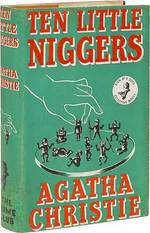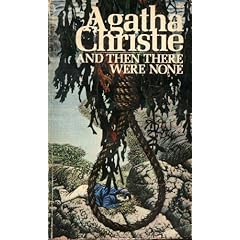There’s certain words that would get you in big trouble if they were included in the title of a new book. Unfortunately for rare book dealers, what was considered acceptable 50 or 100 years ago isn’t acceptable now. This leaves the book dealer in a bit of a bind. What to do with books that have racial slurs in the title or offensive cover artwork? Destroy them as hateful relics of ages past? Hide them behind the counter? Treat them just like any other old book?
While the safe option might seem to be to destroy them, in many ways this is worse than keeping them in circulation. This whitewashes the past. It sanitizes it and makes it easy to pretend certain things didn’t happen. Things weren’t THAT bad. Surely it’s being exagerated…
 (go see a larger version here. Complete with spears and watermelons. That the jacket itself is watermelon colors just makes it worse.)
(go see a larger version here. Complete with spears and watermelons. That the jacket itself is watermelon colors just makes it worse.)
Oh.
This book is probably familiar to many people, just not with this title. It was almost immediately republished as “Ten Little Indians” until it was determined that was also offensive and was republished as “And Then There Were None.” The local school district has asigned this as summer reading for several years in a row. No school district would assign it with the original title. The original title is rarely mentioned in current printings. It will say ‘previously printed as “Ten Little Indians.”‘ This means that it often ends up with a rather disturbing cover design if you DO know the publication history.

Imagine this cover with the original title. It would be yanked off every bookstore shelf in a heart beat! Pretending it never happened just creates a worse situation.
Of course the original title referred to a common 19th century nursery rhyme which was illustrated in many different editions.

This in no way forgives the use in the Christie book, but it provides context. If all the earlier books had been destroyed, the book’s title would have made no sense. Tossing either due to modern sensibilities destroys a bit of a the past and makes it easier to forget just WHY the term is offensive and just how pervasive racism was and still is.
Sometimes the use of offensive terms was meant specifically to shock and offend and recall that past.

The title conveys the subject matter well. You have a good feel for this autobiography just based on the title. It would not have had quite the same impact with a more politically correct title. (and it is still is in print with this title)
Sometimes books themselves originate a particular term.

If all copies of this vanished, it would be unclear where the term had originated. As with the example above this, there were also attempts to reclaim the term as it lent its’ name to a erotic magazine in the 70s. Culture builds on culture… even when the historical roots are offensive. Even if a term is successfully reclaimed, people KNOW its been reclaimed. But it they don’t know what it was reclaimed from, it loses much of its significance.
Pop culture feeds upon itself, building on what went before. Unfortunately this means that if the context is no longer widely known, people wonder why everyone is upset over recycling and old image.

Without knowing the context, recycling the “mammy” design back into wide use seems harmless. But just because the context is more obscure doesn’t mean it’s not there, ready to blow up again. What was acceptable even 30 years ago is no longer acceptable today. The next generation can easily offend the last generation by recycling material that they don’t know the context for.
While these potentially offensive items deserve to stay in circulation because of their historical and cultural significance, they do require more careful handling than your average book. Many items can probably be put on display without issue because they’re recognized as using archaic terms that have a specific historical meaning that can’t be conveyed with another term.

Other things, well, they probably shouldn’t be mixed in with the general stock. They may need to be kept in a cabinet or possibly online only for people looking for items from a specific era. Keep them accessible, but not in the face of people that aren’t expecting to trip over potentially offensive material in their local book shop. Handled tastefully they can often provide a window into the past that helps explain the presents. They’re valuable to collectors and historians alike.

These types of books are not for everyone. Even many dealers may feel uncomfortable handling them and feel they cannot deal with them in a respectful manner. In that case, your best bet may be either not acquiring the item at all or passing it on to another dealer to handle. Some items are almost guaranteed to cause offense, no matter how carefully handled. They were offensive then and they’re offensive now!

(that book is intended as a “humor” book. a very tactless humor book, even for the time it was published)
It’s up to individual dealers to decide how they want to deal with such materials, but just because a book uses racist terms or has an offensive cover is no reason to automatically ban it from your shop. Such items have their place. That place may not be in YOUR shop, but they still have a part to play in history. The ugly parts of history should not be forgotten or they will come back to haunt us.

Good posting Nora – I would like to add to the subject matter (Racism) the issue of sex. I’ve a few books that treat sex in a clinical fashion and a few others that treat it in a lustful fashion.
I’m more comfortable with the clinical side than I am with the lustful side so those are pretty much the the ones I’ve listed on my website so far.
As said, I’ve very few that I’ve come across that I won’t list and I most likely will find more in the future. Not quite sure what I’ll do with them and I don’t believe in book burning. If they do go to a thrift shop I’ll make sure it is not the Salvation Army nor St. Vincent de Paul’s.
I did an article on handling erotica last year:
http://bookshopblog.com/2009/11/07/books-in-plain-brown-wrappers/
handle a fair amount of that sort of thing. ironically I had a longtime customer inquire about finding “The day the Universe Came” about a week after I wrote the article! He’d seen it mentioned somewhere completely different and was looking for more info!
The erotica find amusing because most of the really over the top stuff that’s come in the door came from older ladies wearing mink stoles. They come in, dressed to the nines, plop down the vintage lesbian bondage novels, and say they’d like to trade them in. No problem. I’ve had it happen multiple times with different ladies wearing mink stoles, so its really peculiar.
Oh! One thing I meant to mention is that on my website I find the book that has drawn most interest through the search engines is one found using the search term, “Strange Sexual Practices”. Go figure…
An interesting post! I had no idea that was the original title of “Ten Little Indians.”
I usually handle potentially offensive titles by assuming my customers are mature and sophisticated enough to consider a book within its historical context. They usually are.
I also tend to decline to buy books that, despite historical significance, I don’t want in my shop. An example: a 1930s German edition of Mein Kampf with (presumably) contemporary margin notes in German. That’s interesting historically, but I really would rather not be associated with it or some of the people who tend to collect such things, so I referred the customer to a friend of mine who knows more about antiques than I do.
At least 30 years ago I was shocked at the amount and prices fetched of Nazi material at a Sotheby’s sale. Remarking on it to another dealer, he looked surprised and said Jews were the ones buying it.
Later I had a Jewish professor in Australia ask me to find a copy of the awful propaganda “Protocols of the Elders of Zion”. I did and he was happy. Had he not been a Jew, of course I would have refused.
My 2 cents worth.
Dee
That’s fascinating! I had no idea but it makes sense, I guess, the Holocaust being such an important part of Jewish history.
This whole thread is an example of why I love BSB so much.
I recently purchased some books that included some historically interesting Nazi material that in some cases has a potentially high value such as an early SS songbook and a scarce wartime SS handbook with illustrations of uniforms and arms.
I would not wish to sell it to a sympathethiser and have no immediate ideas on how to find a suitable academic or library outlet for it so for now the items sit on my shelf.
I thought about putting it in auction but that feels like just washing my hands and taking the proceeds anyway…
I wonder if others have had similar quandaries and how they resolved them?
Probably the best bet would be to contact your nearest large university history department and tell them what you have and that you are looking to sell the collection. Indicate that if they aren’t interested, you’d like a referral to someone that might be interested in the collection. Odds are good they may know who in their field WOULD be interested.
You’ll up your odds of getting a good referral by looking over the course list and contacting a professor that specializes in that era. He’ll have more precise knowledge of what libraries and collectors specialize in that type of material.
Agatha Christie’s ‘Ten little…’ is metaphorical in that the characters are the usual white (upper-)middle-class suspects, whereas surely the archetype of the politically incorrect book is ‘Little Black Sambo’, where the author, to add insult to injury, conflated Indian and African stereotypes into a single imaginary tropical mish-mash, of course wildly popular in the British Empire’s homeland in its time. I recall reading years ago that Enid Blyton’s lightweight taxi-driver Noddy was banned in New Zealand for having the wrong attitude to the law (Mr Plod) and having (assumed) homosexual relations with Big-Ears. Until the early 1980s the Negro University Press still proudly published books in New York. A couple of years ago I was treated to a severe dressing down from a black woman for having a shelf with books labelled labelled ‘Afro-American’ instead of ‘African American’, with the additional complaint that ‘afro’ referred only to a haircut ! – this despite some of the books having ‘Afro-American in their titles (this was shelf of new books, not antiquarian). No doubt many in France are less delighted by the implied delights of ‘gay Paree’ than they used to be… Wicked, eh!
Anthony – thanks so much for taking the time to share a great comment with us, hope to hear from you again!